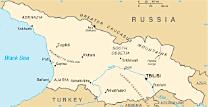On April 29, 2008, the Russian Foreign Ministry accused the Georgian government in Tbilisi of preparing to invade the pro-Moscow separatist region of Abkhazia, which is located on the eastern shore of the Black Sea, along the Russia-Georgia border. Russian officials announced that they would deploy more peacekeeping troops in the region to defend the separatists. Russian government representatives have claimed that the Georgian military has been reinforcing its garrison in the strategic enclave of the Upper Kodori Valley, the most important part of Abkhazia still under control of the Tbilisi government. The Russian Defense Ministry attributed the current crisis to "the strengthening by Georgia of its forces in the immediate proximity to the conflict zones, threats of military force and . . . provocations on the part of Georgian authorities prevent Russian servicemen from performing their peacekeeping tasks." EU foreign policy chief Javier Solana called the Russian threats unwise after he met with Russian Foreign Minister Sergei Lavrov, but his remonstrations appeared to have little impact. "If Georgia puts in place the threat it has made on a number of occasions about the use of force in South Ossetia and Abkhazia," Lavrov warned, "we would be forced to take retaliatory measures to protect the lives of our citizens."
Russian-Georgian Military Buildup Raises Fears of War

